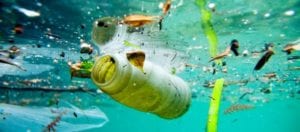A recent study by Irish-based researchers has confirmed that plastic pollution is reaching deep into the ocean with results showing that over 70% of deep sea fish have ingested plastic.
According to Anders Jacobson, co-founder and CEO of Blue, the sustainability focused holding company of clean drinking water solutions provider Bluewater, the results of the study are extraordinarily worrying for human and planetary health.The highest frequencies of microplastic
“It is extraordinarily worrying that plastic particles have now been found in three out of four deep-sea fish thousands of kilometres from land,” he notes. The study, which was published in the journal Frontiers in Marine Science this week, revealed that almost three quarters of a sample of more than 230 deep-water fish collected by National University of Ireland (NUI) Galway scientists had ingested plastic particles. Furthermore the contamination level among the fish species, located in the northwest Atlantic thousands of kilometres from land and 600m down in the ocean, is one of the highest reported frequencies of microplastic occurrence in fish worldwide.Jacobson says that this is further evidence of how ocean pollution by plastic is a serious issue facing society especially since the plastic particles that were found contained additives such as flame retarders and colourants which may pose a threat to human health for generations to come.







